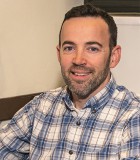
Technological advancement is the theme for modern business. Employers are continually searching for the most up-to-date technology that would help their corporations run more efficiently. Without a technical support team, businesses cannot acquire these capabilities. William Penn University’s Computer Science program stresses the importance of teamwork. Group interaction allows students to bring their ideas together and apply them to a variety of hands-on activities.
The computer science program allows students to gain experience through lab work, lectures, and internships. The faculty aims to provide students with the most practical and applicable experience that can be used in the computer science field. Computer Scientists invent and design new approaches to computing and technology and find innovative uses for existing technology. They study complex problems.
This degree lends itself to preparing students for graduate study in computing, bioinformatics, data analytics, and scientific applications of Computer Science.
Computing has become an essential part of almost all aspects of our lives. Students majoring in Computer Science at William Penn acquire the skills necessary to meet this demand and join this exciting and rewarding career field.
Computer Science experts are in high demand. The computing field is expected to achieve sustained growth of 19% through the year 2026 according to the U.S. Department of Labor, and remains one of the higher-paying career fields for college graduates. In fact, the median annual pay in 2017 was $114,520 for computer scientists. Employers that have hired graduates from the WPU Computer Science program include:
By participating in internships, students are immersed in a professional environment while generating experience and future opportunities. While internships are not required in this program, students will understand their importance and pursue internship possibilities within Oskaloosa and other surrounding communities. Listed below are local companies who have worked with WPU students as interns: